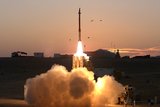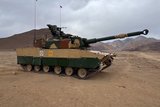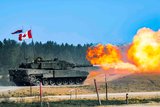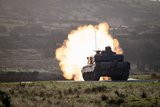Rheinmetall chalks up more munitions and air defence contracts
Finland has approved the purchase of Spike SR, LR2 (picture) and ER missiles. (Photo: Eurospike)
Germany's Rheinmetall has reported a number of contracts covering missiles, air defence systems and large-calibre ammunition in the week of 30 January.
On 30 January it announced that the Finnish Armed Forces had contracted with EuroSpike, a joint venture of Rheinmetall Electronics, Diehl Defence and Rafael, for Spike antitank guided missiles. No quantity was given but the company cited an overall value in the 'mid-double-digit million-euro range'.
Finland has already received 500 Spike MR/LR and 400 Spike ER rounds according to Shephard Defence Insight, and the country's MoD approved purchase of Spike SR, LR2 and ER2 variants in December 2022.
Related Articles
Israel treads a narrow tightrope, says no to Spike for Ukraine
NSPA delivers final modernised PzH 2000 to Lithuania
Finland and Sweden order naval ammunition from BAE
Two days later Rheinmetall revealed it had been contracted by an unidentified international customer to supply unspecified air defence systems, including ammunition, suggesting that this is a cannon- rather than missile-based solution. The order value was also in the 'mid double-digit million-euro range'.
Lastly, on 2 February revealed two further contracts for indirect fire ammunition. An international customer ordered propellant charges worth around €40 million from Rheinmetall Denel Munition (RDM), the group’s South African subsidiary.
Another customer, a NATO member, placed an order with RDM for Assegai 155mm ammunition, worth around €17 million. The Assegai family of ammunition can be fired from any NATO STANAG-compatible artillery system, including the PzH 2000 self-propelled howitzer, Rheinmetall highlighted in its announcement.
NATO members operating the PzH 2000 are Croatia. Germany, Greece, Hungary, Italy, Lithuania and the Netherlands.
Related Equipment in Defence Insight
More from Land Warfare
-
![Land forces review: Tanks, trucks and IFVs dominate but woes remain for Ajax]()
Land forces review: Tanks, trucks and IFVs dominate but woes remain for Ajax
This year has begun with main battle tanks taking the lead while orders for large logistics and support vehicles continued from last year. Additionally, two of the British Army’s most significant contracted vehicle programmes, Ajax reconnaissance vehicle and Challenger 3 tank, continued to make news in January.
-
![Canada looking to expedite purchase of armoured fighting vehicle and a new tank]()
Canada looking to expedite purchase of armoured fighting vehicle and a new tank
Canada is improving its Leopard main battle tank fleet but before this is fully completed, it is expected to begin looking for new vehicles.
-
![UK agrees parallel development and production process for British Army Challenger 3]()
UK agrees parallel development and production process for British Army Challenger 3
In a bid to accelerate delivery of the British Army’s Challenger 3 main battle tank, which has just carried out its first crewed firings with the latest Rheinmetall 120mm L55A1 smoothbore gun, the UK has opted for an unconventional approach.
-
![Romania intensifies search for more tanks and could look beyond Abrams]()
Romania intensifies search for more tanks and could look beyond Abrams
Since signing a contract to purchase 54 M1A2 Abrams tanks last year, Romania has been looking into options to buy more tanks, but it could cast the net wider than Abrams with funding considerations potentially set to shape the outcome.























